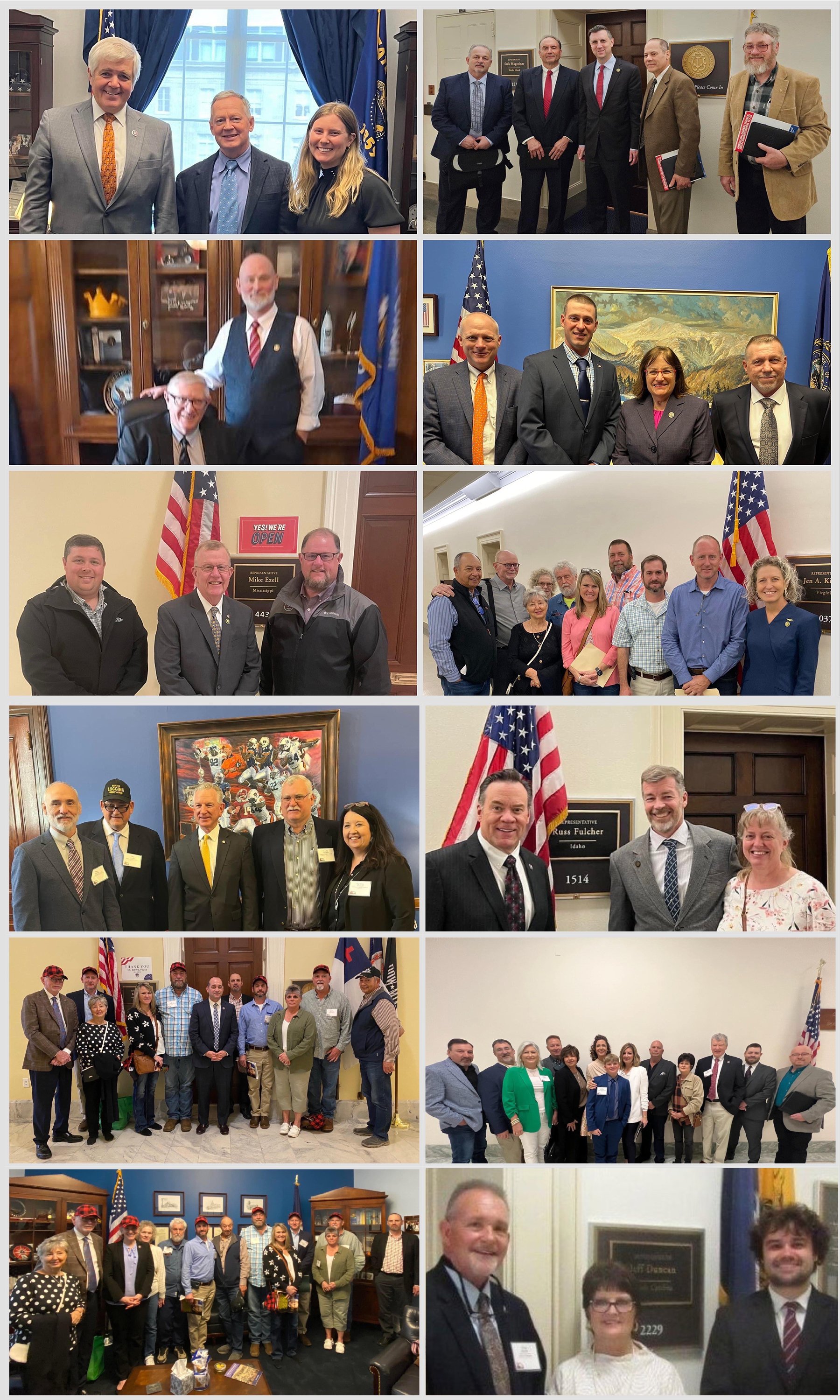From the Woods to the White House: By Way of Capitol Hill
Recently the American Loggers Council hosted the first DC Congressional Fly-In in four years. Seventy-five timber industry representatives from twenty-one states held nearly one-hundred Congressional Meetings.
Along with these meetings, a Congressional Reception was held at the iconic Willard Hotel, where the ALC office is. Five Congressmen: (LaMalfa (CA), Westerman (AR), Collins (GA), Bergman (MI), Golden (ME)) and two Senators (Baldwin (WI) and Hyde-Smith (MS)) attended. Congressman Golden and Westerman were presented with the inaugural ALC Congressional Leadership Award for the House of Representatives, and Senators Collins and Baldwin were the recipients for the Senate. Timber is not a partisan issue, and the American Loggers Council has received strong bipartisan support on our federal legislative agenda.
Additional Congressional staff from other offices attended the reception along with representatives of the USFS, John Deere, and the Biomass Power Association. The Reception was sponsored by ALC Gold and Platinum Members (Tigercat, International Truck, John Deere, CAT, Southern Loggers Cooperative, Fuel & Resources, Morbark, Bitco Insurance Companies, Bandit, and Ponsse) with specific portions also sponsored by International Truck, International Union of Operating Engineers, the Louisiana Loggers Association, the Louisiana Logging Council, Southern Loggers Cooperative, Walsh Timber, the Great Lakes Timber Professionals Association, the Associated California Loggers, and the Professional Logging Contractors of Maine.
The Day on the Hill saw timber industry representatives from Maine, New York, Pennsylvania, Rhode Island, Vermont, Connecticut, New Hampshire, South Carolina, Florida, Georgia, Virginia, Alabama, Mississippi, California, Michigan, Wisconsin, Minnesota, Idaho, Louisiana, Oregon, and Maryland meet directly with their respective state Congressional Representatives and their staff. Timber industry representatives left their logging operations in the woods, traveled from across the country, and waded into the “swamp” of Washington DC, not for personal gain, but to bring all the U.S. timber industry’s voice to be heard through the halls of Congress and to the doors of the White House.
The bank robber Willie Sutton, when he was caught, was asked why he robbed banks. He replied, “Because that is where the money is.” Why do we go to Washington, DC? Because that is where the policy and legislation (money) is made that affects the logging industry. Same concept.
The ALC prepared a comprehensive 24-page Congressional Briefing Package that provided background on the legislative priorities and served as informational literature to share with the Congressional Offices. The issues advocated for include:
Biomass inclusion in the Renewable Fuel Standard
Future Logging Careers
Interstate Access
Truck Driver Incentive
Elimination of the Federal Excise
National Loggers Day
Increased Federal Forest Management
In conjunction with the legislative agenda and meetings, representatives of the American Loggers Council had the opportunity to make a special presentation to the Speaker of the House, Kevin McCarthy. Two months ago, a logger from the east coast (I cannot recall who it was, but if somebody knows, please let the ALC know) called the ALC and suggested that a gavel made from wood from across the country be made and presented to newly elected Speaker of the House McCarthy. Having worked with acclaimed Montana wood artist Ron Kelley, the ALC contacted him and asked if he would craft a custom-made gavel with wood species from across the country. Montana ALC Board Member Ken Swanstrom worked with Ron, and he produced the perfect Speaker’s gavel. Considering that the Speaker’s home state is California, the Associated California Loggers secured a meeting with Speaker McCarthy where their delegation (Eric Carleson, Mike Albrecht, and Jeff Holland), ALC President Andy Irish (ME), and ALC Executive Director Scott Dane made the presentation to the Speaker of the House. Following the presentation, a meeting was held with Speaker McCarthy’s staff to discuss the ALC legislative agenda. The gavel was constructed from the following species, and their characteristics, regional representation, and uses were noted.
Black Walnut – Found across a wide swath of the US, it is one of the rarest and most valuable hardwood species in North America.
Holly – The state tree of Delaware, Holly is often associated with Christmas because of its use in making Christmas wreaths.
Alder – Primarily a western states tree, found in California, Oregon, Washington, Idaho, and Montana, Alder symbolizes strength, protection, determination, and confidence.
Maple – One of America’s best-loved trees, claimed as the state tree more than any other single species, including New York, Vermont, West Virginia, Rhode Island, and Wisconsin
Gum Wood – The Gums are an important part of the Eastern hardwood forests, used in veneer, plywood, cabinets, and furniture.
Poplar – The state tree of Tennessee and Kentucky, these trees are fast growing and key to paper making.
Cedar – Cedar wood is rot-resistant and often used for fence posts, shingles, and outdoor furniture. Its Latin name, arborvitae, means tree of life, symbolizing strength, long life, and everlasting friendship.
Ash – Known in Scandinavian mythology as the tree of rebirth and healing. Ash tree wood is hard, heavy tough, and is used in making bats for America’s pastime, baseball.
Mesquite – Prevalent in Texas but native to the Southwest, their deep roots enable them to thrive in harsh environments and provide resources ranging from construction materials to medicinal uses.
In making the gavel presentation, the ALC stated, “like the wood from the trees represented in this gavel, the American logger represents different regions, provides different benefits, have different characteristics, but all contribute to the culture and society of America from coast to coast. As you govern, may this gavel serve as a reminder of the complex and integral component of the country and guide your consideration and efforts to preserve not only the timber industry but the country as a whole.”
Friday morning, the Spring ALC Board of Directors Meeting was held.
Capping off the Fly-In was a White House tour for 45 ALC members, including Ponsse President of North America Pekka Ruuskanen.
The consensus from all states was that their meetings and interaction were met favorably, and the Congressional Representatives and staff were more engaged and supportive than in some prior meetings. Those that attended and participated opened doors that the ALC will continue to take advantage of in our follow-up and push to pass our legislative priorities.
The ALC representatives provided Congress and the Administration with the information and opportunity to address some of the threats and challenges to the timber industry. Some of these Bills have been introduced with bipartisan support in both the Senate and the House.
Future Logging Careers Act
Introduced in the Senate and House on March 7th, 2023, by Senator Risch (ID), Senator King (ME), Congressman Thompson (PA), and Congressman Golden (ME). Additional cosponsors include Senators Crapo (ID), Senator Collins (ME), Senator Scott (SC), Senator Cornyn (TX), Congressman Fulcher (ID), and Congressman Pingree (ME). This bipartisan, bicameral legislation will allow logging families the same opportunity to pass on experience as farming families can as they prepare for the succession of these multigenerational family businesses.
Safe Routes Act
Bipartisan support (Congressman Gallagher (WI) and Congressman Golden (ME)) for the Safe Routes Act was demonstrated with the recent introduction in the House of Representatives.
This is a safety bill, first and foremost. It would simply allow (as has been established by precedent in numerous states) for current state weight limits for logging trucks operating on non-federal roadways to be extended to the interstate system. Representative Gallagher drove in a logging truck transiting the current non-interstate route through communities, rural roads, school zones, intersections, and single-lane routes and then the alternative interstate route this legislation would allow.
“It’s crazy how inefficient it is,” Gallagher said. “it’s bad for the truck, it’s bad for the trucker, it’s bad for the road, it’s bad for the environment, it’s less safe, so it absolutely makes no sense.”
Safe, Modern Trucks Act
With bipartisan Congressional support from Congressman LaMalfa (CA) and Congressman Pappas (NH) the Safe, Modern Trucks Act was introduced. This legislation recognizes that the 100-year-old 12% federal excise tax on new trucks and trailers de-incentivizes investment in new trucks by adding $30,000 to the price. The excise tax on heavy trucks is the highest excise tax levied on any product in the country. Half of America’s trucking fleet is over 10 years old, is less fuel efficient, and emits greater emissions. “On one hand, regulators want operators out of older trucks, but on the other hand, this tax penalizes them for trying to update their equipment,” said Congressman LaMalfa. Co-sponsoring the Bill are Congressman LaHood (IL) and Congressman Blumenauer (OR).
“If Congress is serious about creating jobs, reducing emissions, and improving highway safety, then repealing the Federal Excise Tax should be a priority.” Chris Spear, American Trucker Associations, President and CEO.
Strengthening Supply Chains Through Truck Driver Incentives Act
Introduced by U.S. Representatives Spanberger (VA) and Gallagher (WI) the Strengthening Supply Chains Through Truck Driver Incentives Act, the legislation would provide a short-term, fast and straightforward incentive to attract and retain new drivers.
“During the pandemic, truckers didn’t have any remote options – yet they went to work every single day to keep our economy moving and our communities strong. Our country needs to step up and recognize their hard work – and we need to encourage more Americans to enter this industry,” said Spanberger.
The Bill would create a two-year refundable tax credit of up to $7,500 for drivers with valid CDL-A who drive at least 1900 hours per year. It would also create a new refundable tax credit of up to $10,000 for new truck drivers enrolled in a registered trucking apprenticeship and who meet other requirements.
The “Ask” was for Congressional Representatives to support and sign onto these pieces of legislation. The goals and objectives are to get some, if not all, of these legislative priorities across the finish line (President’s desk).
Without the successful inclusion of these priorities and the positive message it will convey to the struggling timber industry, the logging and trucking infrastructure will be hard-pressed to remain invested in the future of the forest products industry.
The message was - We are here to represent a vital sector of the forest products and forest management team. Without us, none of the other environmental, economic, or forest management benefits are possible. For the most part, we are not asking for money, we are just asking you to pass legislation that allows us to do our job, make a living, create jobs, improve safety, protect the forests, and recognize the contribution we make to improving the environment and economy.
There is nothing more persuasive than for Congressional Representatives to hear firsthand from the men and women that actually work in the woods and drive logging trucks about the challenges that they face and how Congress can help ensure this vital industry survives.
The world is run by those that show up. If you are not at the table, you are probably on the menu. The American Logging Council members showed up and were at the table. But the work is not finished. All timber industry representatives are encouraged to contact their respective Congressional Representatives and request their support and sponsorship of the Bills referenced.




